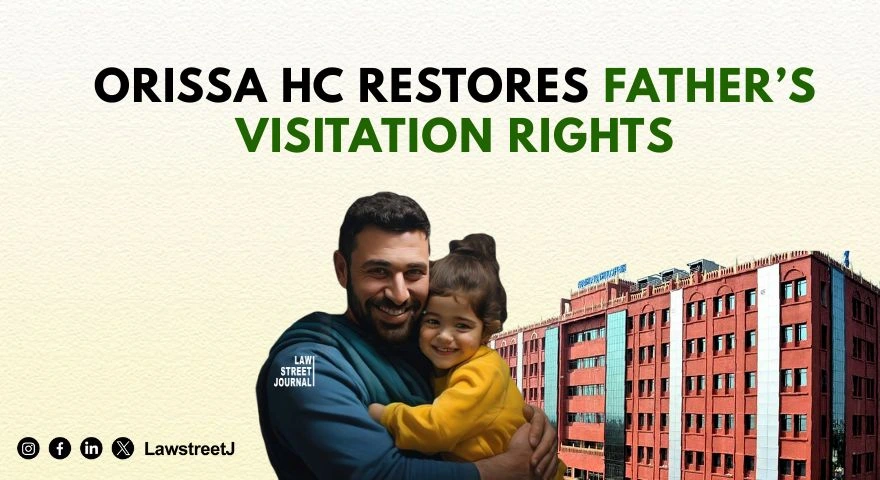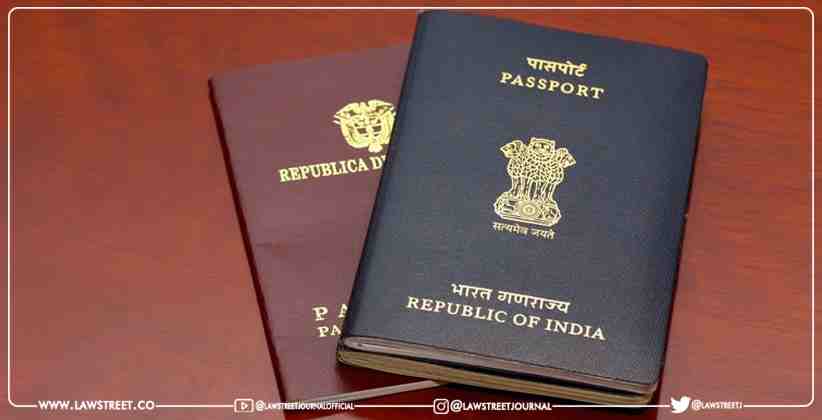Orissa: The Orissa High Court set aside a Family Court order denying visitation rights to a biological father, holding that visitation is an important right of parents to see children born from their wedlock, and that a child is entitled to the love and affection of both parents.
Justice Sanjay Kumar Mishra made these observations while allowing a writ petition challenging an order dated March 24, 2025, of the Family Court, Cuttack, which rejected the petitioner’s application for visitation rights with his seven-year-old son during the pendency of a custody case.
The petitioner and Opposite Party No. 1 married on July 9, 2011, lived together for five years, and then separated due to temperamental differences. Opposite Party No. 1 filed MAT Case No. 94 of 2023 under Section 13(1)(ia) and (ib) of the Hindu Marriage Act, 1955, before the Family Court, Bargarh, which decreed divorce ex parte. She subsequently remarried an elderly man who has three children from his first marriage.
The petitioner claimed the parties had agreed their daughter would remain with Opposite Party No. 1, while their son would remain in his exclusive custody, with mutual visitation rights. However, on February 5, 2024, after the petitioner dropped his son at Cambridge School, Cuttack, the child reportedly fell ill and was taken away by Opposite Party No. 1 and her second husband. Since then, she allegedly has not allowed the petitioner to meet or communicate with the child.
The petitioner lodged an FIR, made a representation to the DCP, and instituted ICC Case No. 35 of 2024, but without tangible result. He then filed an application under Section 6 of the Hindu Minority and Guardianship Act, 1956, for custody of his son before the Family Court, Cuttack (C.P. No. 543 of 2024), and moved I.A. No. 117 of 2024 for visitation rights.
The Family Court rejected the application citing the “absence of suitable neutral venue and apprehension of untoward incidents.” It observed that the petitioner had not mentioned the place and manner of meeting his son, and noted “there is possibility of untoward incident, if the petitioner will be allowed to visit the child in the present scenario.”
Counsel for the petitioner argued that the Counsellor’s report recorded a mutual understanding that the son would stay with the petitioner and the daughter with Opposite Party No. 1, with visitation rights for both. The Family Court, it was submitted, erroneously observed that the petitioner was “only interested to see his son” because he did not file for the daughter’s custody, despite the mutual understanding. The apprehension of “untoward incident” was said to be baseless and unsupported by the record.
Counsel for Opposite Party No. 1 contended that there was no infirmity in the impugned order, and that the visitation application was premature and rightly rejected.
As an interim measure, by order dated May 16, 2025, the High Court permitted the petitioner to make calls/WhatsApp calls once daily to speak to his son. On August 12, 2025, the Court directed both parties to remain present with the child in Chambers at 2 p.m.
Justice Mishra interacted with the child alone in Chambers. The child entered weeping but became calm after counselling. When asked the reason, he replied in Hindi: “Bahar jo uncle khade hue hain, unse dar lagta hai” (I am afraid of the uncle standing outside). When asked his name, he said “Sanjay Sharma,” i.e., his biological father. When asked his father’s name, the child answered “Ashok Lodha,” the second husband of Opposite Party No. 1.
Justice Mishra observed that this was “almost unbelievable and seems to be the outcome of being tutored by Opposite Party No. 1.” The Court noted that the petitioner had not remarried, while custody of both children remained with their mother, who married an elderly person who already has three children.
The Court held: “The refusal of visitation right to the natural father by the learned Judge, Family Court, Cuttack, vide the impugned order, appears to be unjust and contrary to the settled position of law.”
Justice Mishra relied on a coordinate Bench judgment dated May 14, 2025, in Manjusha Singhania v. Nimish Singhania (W.P.(C) No. 28784 of 2019), which held: “The visitation right is an important right of either of the parents to see the children born out of their wedlock… The child is entitled to the love and affection, protection and guidance of both the parents and their family… While deciding any matter relating to the custody or visitation right of the child, the paramount consideration is the welfare of the child.”
The Court also cited the Supreme Court judgment in Yashita Sahu v. State of Rajasthan, (2020) 3 SCC 67, which observed: “A child, especially a child of tender years, requires the love, affection, company, [and] protection of both parents. This is not only the requirement of the child but is his/her basic human right… It is only in extreme circumstances that one parent should be denied contact with the child. Reasons must be assigned if one parent is to be denied any visitation rights.”
Emphasizing the welfare principle, Justice Mishra stated: “Since visitation right is an important right of either of the parents to see the children born out of their wedlock and, while deciding the welfare of the child, it is not the view of one spouse alone which has to be taken into consideration, this Court is of the view that the issue of visitation must be decided on the basis of what is in the best interest of the child.”
Accordingly, the Court set aside the impugned order and remitted the matter to the Family Court to pass appropriate orders—after consulting the parties and their counsel—regarding the place, frequency, time, and manner of meetings, with terms and conditions to maintain decorum and avoid untoward incidents. The Court further directed that appropriate conditions be framed to enable telephonic or WhatsApp communication during the pendency of the custody case, with orders to be passed within three weeks.
Mrs. Suman Modi appeared for the petitioner; Mr. Kirtan Dang appeared for Opposite Party No. 1.
Case Title: Sanjay Sharma v. Dolly @ Sakhi Sharma & Another




![Orissa HC awards Rs 10 lakh to father who lost child to stray dog attack [Read Judgment]](/secure/uploads/2023/12/lj_3371_Stray_dog_menace.jpg)
![Orissa HC rules in favour of BJDs Lok Sabha MP Anubhav Mohanty in divorce plea [Read Judgment]](/secure/uploads/2024/01/lj_2524_Anubhav_Mohanty.jpg)
![Indian Courts this Week: Law Street Journal's Weekly Round-Up of SC & HCs [Jan 1 - Jan 6]](/secure/uploads/2024/01/lj_9050_WhatsApp_Image_2024-01-06_at_12.07.10_PM.jpeg)




